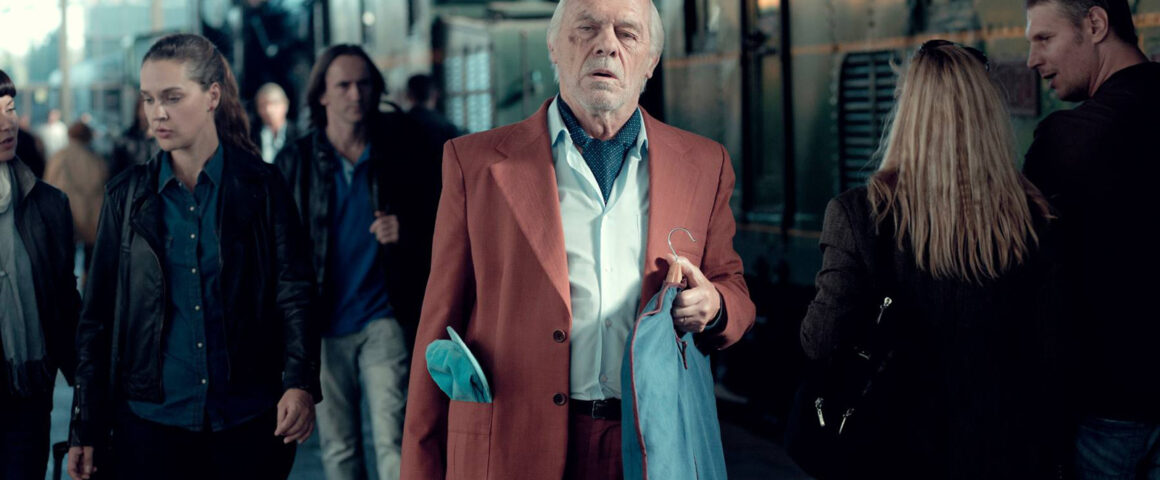The Last Suit (El Último Traje), the second feature film by writer/director Pablo Solarz (“Intimate Stories”) is an Argentine/Spain production that follows the journey of Abraham Bursztein (Miguel Ángel Solá, “The Impatient Alchemist”) an 88-year-old holocaust survivor who found refuge in Argentina, where he created a life for himself, working as a tailor and raising a family that now spans four generations. Faced with family pressure to enter an assisted-living facility, Abraham decides to subvert the plans of his relatives, and like a modest, cantankerous King Lear, take what future he has left into his own hands. This starts him on a quest to travel to Lodz in Poland in order to locate a childhood friend who saved him from the Nazis, determined to repay him by fulfilling a long overdue promise — to deliver a blue suit as appreciation.
The resolute Bursztein books an itinerary that will allow him to travel by air from Buenos Aires to Spain, and then by train to his final destination in Poland. During this arduous journey, Bursztein displays a determination to complete his quest that hovers close to implausibility. What chance is there that his friend is still alive after 70 years, or even lives in the same district as the one they shared during the Nazi invasion? Why has he purchased a one-way ticket? How will he manage to fulfill his idiosyncratic resolve to travel by train from France to Poland without setting foot in Germany, a country he abhors even more than his native land? And how can he overcome these challenges while he limps through life with a bum leg?
Nevertheless, the plot premise works, and for a number of reasons. First, there is Solá’s excellent multilayered portrayal of the protagonist that eschews stereotyping. The actor creates a convincing three-dimensional character who exhibits wisdom, humor, suffering, and shrewdness. Also, one must consider the logic behind the story’s inciting incident. Why should a proud, determined man passively accede to the contemporary practice wherein a family disposes of a relative as though he were as outdated as last year’s iPhone?
Fortunately, other loners seem to appear magically along Bursztein’s journey. He gets assistance from Leon (Martín Piroyansky, “Ten Days Without Mom”), an unsuccessful, goateed musician whom he meets on his flight. In Spain, he befriends María (Ángela Molina, “You Can’t Save Yourself Alone”), a former nightclub singer who operates the hotel where Bursztein briefly stays. Continuing by train, he meets Ingrid (Julia Beerhold, “Partly Sunny”), a German anthropologist who can communicate with Bursztein because she learned Yiddish in graduate school, and finally, when Bursztein arrives in Poland, Gosia (Olga Boladz, “Another Day of Life”), a Spanish-speaking Polish nurse, drives him through the narrow streets of Lodz to help him locate the address of his long-lost friend.
At times, Solarz comes close to incorporating so many cinematic elements that the film is in danger of flooding the viewer with more information than can comfortably be handled. For example, there are several obvious references to King Lear. Bursztein’s estranged daughter is named Claudia (Natalia Verbeke, “Family Heist”), not Cordelia. The Last Suit is shot in black and white, while flashbacks and memories are rendered in color; and the soundtrack includes klezmer music, which, although often appropriate, could have been incorporated a bit more sparingly.
But to say these elements injure the strengths of the film, which include Solá’s complex performance and minor characters that are uniquely and fully rendered even when they don’t account for a lot of screen time, is to complain about a gourmet dinner because the tablecloth is a tad off-center.
In today’s media environment, The Last Suit would be relegated to “art house” material, probably because most film-goers don’t have the patience to watch a character-driven, intimate film with subtitles and subtle performances. It’s like the attitude in many modern households that there are better, more convenient things to do than give an exceptional, albeit elderly family member his due.



